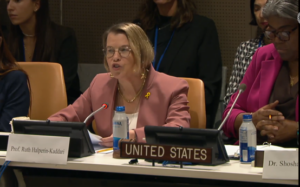Professor Ruth Halperin-Kaddari of the Rackman Center, a Hadassah Foundation grant recipient, recently briefed us on two issues: the current challenges women in Israel are facing and the Dinah Project, an initiative advocating for the victims of sexual crimes on October 7. Based at Bar Ilan University, the Rackman Center promotes legal and social change for women in family law and increases women’s representation in the public religious sphere. Below are some highlights from Prof. Halperin-Kaddari’s briefing, in her own words:
The Global Context
When we talk about the situation of women in Israel, it is really important to bear in mind that they cannot be disconnected from the global phenomena of backsliding democracies and the rise of populist or authoritarian regimes. At the same time, women in Israel are experiencing it probably in a harder way than other democracies.
Lack of Feminist Representation in Government
Our government currently has 36 ministers, and only five are women. It’s important to bear in mind that the question is not just the number of women, but also what kind of women. Unfortunately, those women who are in the governing coalition are the opposite of feminists. Some of them have a misogynistic agenda. But still, the fact is that there are hardly any women in this government. The previous government had 10 women heading governmental ministries; this government let them go and replaced each one with a man.

Women dressed as handmaids at a 2023 demonstration in Israel. (Wikimedia Commons)
How Judicial Reform Threatens Women
Judicial reform severely weakens the High Court of Justice, and basically every right that women in Israel now have is either thanks to its creation by the High Court of Justice or assurance that it will be enforced by the High Court of Justice. When that safeguard is gone, we are left with no protector of women’s rights because other than the courts, there’s really no separation of powers in Israel. The executive branch has total control over the parliament.
Legislation That Threatens Women
One bill that is probably going to be passed soon expands the jurisdiction of the rabbinical courts, a judicial institution that completely excludes women: There are no women judges in these religious courts. This government is going to expand the jurisdiction so that they will have the possibility to adjudicate not only matters of marriage and divorce, but every matter under civil law, including employment, commercial contracts, finances, and more. Another example of what’s on the table is a bill that will make it legal to refuse services on religious grounds: So if, for instance, your daughter walks into a store and she is wearing a sleeveless shirt, it will be completely legal for a vendor to tell her that he’s not going to serve her because she’s not dressed modestly enough and that serving her contravenes his religious beliefs.

Ruth Halperin-Kaddari speaking at the United Nations in 2024. (Courtesy of the Rackman Center)
Seeking Justice for Victims of Hamas Sexual Violence
We realized early on that we had an important role to play due to our expertise advocating for women’s rights and our national and international standing. I served 12 years on the UN Committee on the Elimination of Discrimination Against Women (CEDAW), and while I was nominated by Israel, I was elected by two thirds of the countries who are party to that convention and served as a representative of all women worldwide. This gave me credibility and allowed me to stand and be seen, not as a spokesperson for the Israeli government, but as somebody who speaks for women’s rights worldwide. That has expanded our work at the Rackman Center to incorporate the Dinah Project for recognition and justice for victims of sexual violence in conflict. On our website, you can see a very, very comprehensive clearinghouse of all the information relevant to the sexual atrocities of October 7. One of our major achievements was facilitating the visit of the Under Secretary General Pramila Patten, Special Representative on Sexual Violence in Conflict, with whom I worked on the CEDAW committee. I could convince the Israeli decision makers to allow her to come, explaining to them that if she doesn’t come, then we’re losing the battle for recognition on the historical and the international front. And the report that she published last March was really a game changer. It’s the beginning of setting the record straight, of working towards achieving this historical justice.

Pramila Patten (U.S. Institute of Peace via Wikimedia Commons)
On Working with the United Nations Despite its Anti-Israel Reputation
The UN is not a monolithic organization. It’s a huge organization, and there are many sections in it that are very biased against Israel. But there are also allies. Pramila Patten, the Special Representative on Sexual Violence in Conflict, is not the only one: If you go on our website, you will see our engagement with the Special Rapporteur on Torture, Dr. Alice Edwards, whom we hosted two months ago as part of a roundtable with representatives from the Ministry of Justice, the police, and the IDF. I wholeheartedly reject the perception, which too many Israelis and too many Jewish people out of Israel hold, that the whole UN is against us and we’re better off without them. We’re not better off without the UN. Like so many other systems, it has to change, but to change it you need to find a way to work from within.
